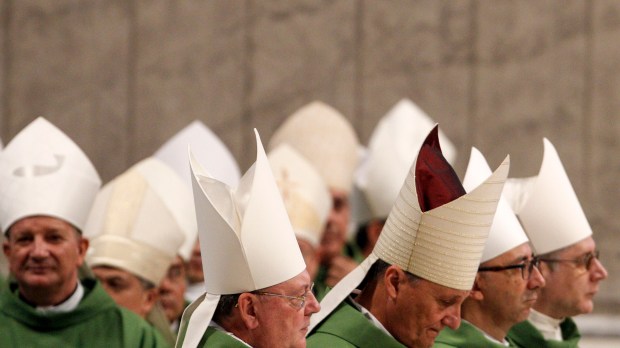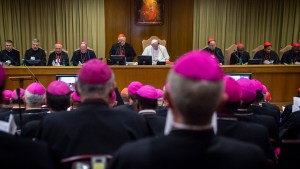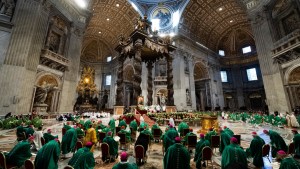On October 17, 2021, all the dioceses of the world were invited to launch the first phase of the Synod on Synodality, a new and universal event that will last until March 2022. I.MEDIA offers you a world tour of nine dioceses and their synodal “first steps.”
Diocese of Regensburg (Germany): Renewal does not mean adapting to the spirit of the times
In Regensburg, Bishop Rudolf Voderholzer opened the synodal process with a warning reported in the German periodical Die Tagespost: “I have never heard that the Church has renewed itself by adapting to the demands of the spirit of the times.” The German bishop, speaking at Vespers inaugurating the synodal process, insisted instead on the need for listening to the Word of God and the Holy Spirit, for prayer, and for conversion in service to the poor and the sick. In his homily, he also reminded his flock that the Synod should not be understood in a Protestant sense. The bishop, who recently distinguished himself by his criticism of the German synodal process, also indicated that a good process implies “the evidence of encounter, exchange, mutual listening, and discernment of the Holy Spirit.”
Diocese of Seoul (South Korea): Walking together
Cardinal Andrew Yeom Soo-jung, Archbishop of Seoul, urged all the faithful to walk together. The opening Mass of the synodal process provided a striking image of his message, as the cardinal pushed the wheelchair of a disabled member of the congregation up the aisle. “We should not focus on creating any outcomes throughout the Synod. But instead, each of us needs to tell the Holy Spirit our own stories and deepen our conversations by sharing the joy, peace, challenges, and hopes presented by the world around us during this Synodal journey,” he said.
Diocese of Novara (Italy): An exercise in harmony
For Bishop Franco Giulio Brambilla, an influential theologian within the Italian Bishops’ Conference (CEI), interviewed by the daily L’Avvenire, synodality means the search for “the correct loop between Gospel and culture, between Church and world, between proclamation and territory.” This relationship implies fighting “modern egolatry,” insists the bishop of Novara. “We can only be witnesses in the plural, or rather in a choral way,” he says, warning against the damage that an “out-of-tune voice outside the choir” produces. He also stressed the importance of this diocesan phase, which “harmonizes” in Italy with the national synodal journey opened by the CEI last June.
Archdiocese of Warsaw (Poland): Open to all
In Warsaw, Cardinal Kazimierz Nycz celebrated the opening Mass of the synod in St. John the Baptist Cathedral. During the Mass, reports the Polish daily Rzeczpospolita, the assembly was reminded of their baptism, the sacrament that unites the People of God and invests them with their synodal mission. Interviewed by the Polish news agency PAP, Bishop Piotr Jarecki, its auxiliary bishop, insisted on the importance that must be given, during this synod, to the poorest. He announced that he is working on this point with the Community of Sant’Egidio. “We do not exclude anyone,” he insisted, even encouraging the LGBT community to participate. “If LGBT groups express their desire to participate in the synod, we will not exclude them. Let them work on these topics and send us the results of their discussions,” he said.
Archdiocese of Barcelona (Spain): Silence and humility
The Cardinal Archbishop of Barcelona, Juan José Omella, says that the synodal process involves listening to God, and “listening to God requires a lot of silence and a lot of humility,” reports the Religión Digital website. During his homily inaugurating the launch of the synod in Catalonia, he recalled that this process of “walking together” is an opportunity for all the People of God. It is a matter of “listening to one another” to understand God’s will, he insisted.
Archdiocese of Vaduz (Liechtenstein): A small diocese for a complex process
Archbishop Wolfgang Haas of Vaduz (Liechtenstein) has decided not to participate in the great worldwide synodal process. He explains this on the website of his archdiocese: “I am of the opinion that in our small archdiocese we can, for good reasons, refrain from carrying out such a complex and sometimes even complicated procedure, which in our latitudes runs the risk of becoming ideological.” He says, however, that discussions are already possible in his diocese, and that he remains open to those who wish to express themselves.
Diocese of Pamiers (France): Dealing with the revelation of the extent of abuse
In Ariege, France, in the diocese of Pamiers, Couserans and Mirepoix, Bishop Jean-Marc Eychenne, in an article published on the diocesan website, says that the synod is a “path of community conversion” that could provide a response to the crisis resulting from the revelation of cases of abuse. In the light of the Sauvé report, he says, the Church can find a way forward and restore the trust it has lost. He points out that one of the causes of these tragedies is “a very significant deficit of a common and structural capacity to listen to the voice of each person,” especially the smallest.
Diocese of Santo André (Brazil): Doing away with a centralized Church
Bishop Pedro Carlos Cipollini, of Santo André, has published a book to help his Brazilian confreres understand the meaning of the synodal process. He himself, he explains in the book’s preface, has recently experienced it successfully in his diocese. Synodality, he argues, is the way to fight against the progress of secularism and atheism, and brings everyone “back to the origins” of the Church. He warns against the sterility of “a centralized and universalist model of the Church” and urges “the collaboration of all.”
Archdiocese of Monterrey (Mexico): An approach rooted in the Eucharist
In Monterrey, Archbishop Rogelio Cabrera López asked that everyone “seriously prepare themselves to live the synodal process, participating consciously in the activities that will be organized.” He stressed that synodality would only be possible if there is communion. “Only from the strength that emanates from the Eucharist will we be able to give life to this journey that commits us to charity towards all,” he said.
Archdiocese of Madrid (Spain): A time of grace
In Madrid’s Almudena Cathedral, Cardinal Carlos Osoro explained that embarking on a synodal journey means “collaborating in God’s work in history.” For this, the Archbishop of Madrid asked for “the broadest possible listening to all,” urging personal meditation but especially listening to others “inside and outside” the Church. “This synodal work is also a time of grace, because it is an opportunity to meet, listen, and reflect,” he said.



